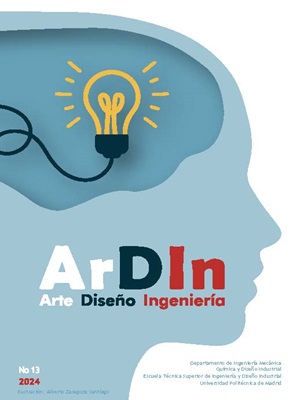Una experiencia de aproximación para un análisis gráfico-cualitativo: competencias, diseño, arte y ODS = An approach experience to graphic-qualificative test: skills, design, art, and SDG
DOI:
https://doi.org/10.20868/ardin.2024.13.5220Keywords:
ODS, arte, análisis, diseño, competencia, SDG, Art, design, skillAbstract
En los últimos años, son numerosas las acciones que se vienen desarrollando en el ámbito formativo para trabajar en el alcance de los Objetivos de Desarrollo Sostenible de la Agenda 2030 (Naciones Unidas, s.f.). Desde el contexto universitario se yerguen muchas de las iniciativas que, desde la investigación e innovación, ofrecen la posibilidad de sumar esfuerzos para contribuir a la sostenibilidad social y medioambiental. Con la certeza de que planes formativos desplegados en áreas de diseño, poseen una naturaleza directamente relacionada con los ODS y el arte, se realiza un estudio cualitativo de las competencias presentes en las guías docentes de sus asignaturas, para hacer visible dicha relación. En primer lugar se realiza una aproximación en formato de preanálisis, cualitativo, durante el cual se amplía significativamente el conocimiento que los analistas poseen sobre este tipo de métodos. Finalmente, los resultados arrojan un diagnóstico donde el arte y los ODS se encuentran en un territorio afín a los planes de estudio analizados, pero no con el grado de presencia y alineación como podía sospecharse en un inicio.
Abstract
In recent years, numerous actions have been developed in the field of education to work towards the achievement of the Sustainable Development Goals of the 2030 Agenda (United Nations, n.d.). From the university context stand many initiatives that, from research and innovation, offer the possibility of joining efforts to contribute to social and environmental sustainability. With the certainty that training plans deployed in design areas have a nature directly related to the SDGs and art, a qualitative study of the competencies present in the teaching guides of their subjects is carried out in order to make this relationship visible. First, a qualitative pre-analysis approach is carried out, during which the analysts' knowledge of this type of methods is significantly expanded. Finally, the results show a diagnosis in which art and the SDGs are in a similar territory to the curricula analyzed, but not with the degree of presence and alignment as could be suspected at the beginning.
Downloads
References
Cáceres, P. (2003). Análisis cualitativo de contenido: una alternativa metodológica alcanzable. psicoperspectivas. Revista de la escuela de piscología. Facultad de Filosofía y Educación Pontificia Universidad Católica de Valparaiso., II, 53-82. https://doi.org/http://dx.doi.org/10.5027/psicoperspectivas-Vol2-Issue1-fulltext-3
Hernández Sampieri, R., Fernández Collado, C., & Baptista Lucio, P. (2014). Capítulo 1: Definiciones de los enfoques cuantitativo y cualitativo, sus similitudes y diferencias. En I. N. Electoral, Métodos y técnicas de investigación social (págs. 2-21). McGraw Hill Education.
Medina-Moya, J. (2014). El proceso de comprensión en el análisis de datos cualitativos. magis. Revista Internacional de Investigación en Educación., 7(14), 39-54. https://doi.org/https://doi.org/10.11144/Javeriana.M7-14.EPCA
Menéndez Varela, J. L., y Gregori Giralt, E. (2016). Las rúbricas en la valoración de las guías docentes. Reflexiones sobre su impacto en la mejora educativa. Observar, 10(1), 84-102. https://www.observar.eu/index.php/Observar/article/view/66
Ministerio de Ciencia, Innovación y Universidades. (2018). PLan de Acción para la implementación de la Agenda 2030 en España. https://transparencia.gob.es/transparencia/dam/jcr:6e0f06b9-a2e0-44c0-955a-dad1f66c11d7/PLAN%20DE%20ACCI%C3%93N%20PARA%20LA%20IMPLEMENTACI%C3%93N%20DE%20LA%20AGENDA%202030.pdf
Montero Curiel, M. (2010). El Proceso de Bolonia y las nuevas competencias. Tejuelo(9), 19-37. https://dialnet.unirioja.es/servlet/articulo?codigo=3719324
Naciones Unidas. (s.f.). Objetivos de Desarrollo Sostenible. https://www.un.org/sustainabledevelopment/es/objetivos-de-desarrollo-sostenible/
Observatorio sobre las Didáctica de las Artes (ODAS). (s.f.). https://www.odas.es/
Pérez Gómez, D. C., y Moreno Nery, R. L. (2019). La investigación cualitativa: un camino para interpretar. En J. Mendoza González, N. S. Esparragoza Bermejo, & (coords.), Educación: Aportaciones metodológicas. México: Universidad Estatal de Oriente.
Pérez-Montoro, M. (2022). Comunicación Visual de la Información. Qué y cómo podemos narrar con datos. IBICT. https://diposit.ub.edu/dspace/bitstream/2445/183791/4/P%C3%A9rez-Montoro%20%282022%29%20Comunicaci%C3%B3n%20visual%20de%20la%20informaci%C3%B3n_def.pdf
Universidad Internacional de la Rioja. (s.f.). La Universidad en Internet: https://www.unir.net/
Downloads
Published
Issue
Section
License
ArDIn does not charge authors for processing or publishing an article and provides immediate Open Access to its content. All content is available free to the user or their institution. Users are permitted to read, download, copy, distribute, print, search or link to the full text of articles, or use them for any other lawful purpose, without prior permission from the publisher or author. This is in accordance with the BOAI definition of open access.
- Authors retain the copyright and grant to the journal the right to a Creative Commons attribution / Non-Commercial / Non-Derivative 4.0 International (CC BY NC ND) License that allows others to share the work with an acknowledgement of authorship and non-commercial use.
- Authors may separately establish additional agreements for the non-exclusive distribution of the version of the work published in the journal (for example, placing it in an institutional repository or publishing it in a book).
Unless otherwise indicated, all contents of the electronic edition are distributed under a Creative Commons license.













